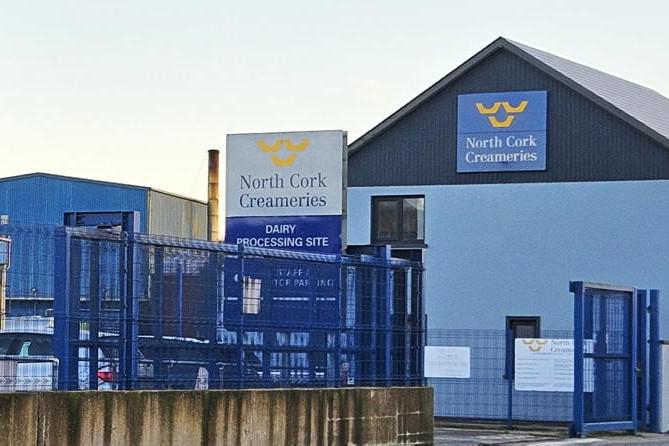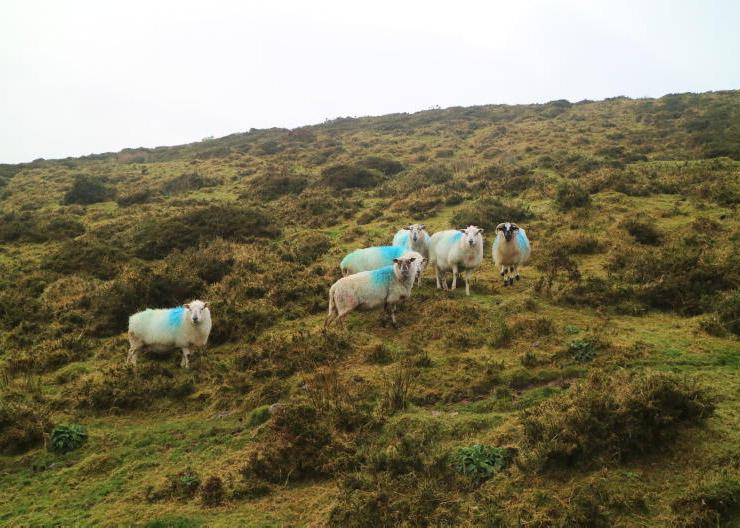Success and money is at the heart of the split in the Kerry milk catchment.
Kerry Group plc has written to all its milk suppliers giving them notice that the current milk supply contract is coming to an end.
The co-op is threatening a return to arbitration, but hasn’t pulled the trigger yet. We understand the door is still open for the farmers to buy the dairy business.
However, there is division almost everywhere you look in Kerry.
Let’s explain briefly some of the issues. The milk supply contract was signed up for a rolling 10 years with a clause stating that either party could give five years’ notice of ending the contract. Kerry plc has given notice to suppliers.
As part of the contract, Kerry signed up to paying the leading milk price dependent on a list of conditions, and sorting that out that is causing one row
When they signed up, the nice bit for farmers in the current milk supply contract was that they had a 20% growth allowance on volumes produced in 2013.
Some suppliers have now grown well beyond this as many suppliers didn’t take up their allowed growth volume.
As part of the contract, Kerry signed up to paying the leading milk price dependent on a list of conditions, and sorting that out that is causing one row.
The arbitrator ruling on the milk price row essentially clarified the comparators, but said go back and talk through it again.
In the last two weeks, Kerry Group plc has indicated to advisory groups that a new milk supply contract would not include a clause on leading milk price and that previous reference volumes would be maintained.
Old and new money
The value in the co-op shares is phenomenal, based primarily on the rise in value of the plc share.
Thirty years ago, co-op shares that were once thrown in a box with little value could now be worth hundreds of thousands.
The share redemption scheme that started in 2019 set the conversion of 5.9 plc shares for one co-op share and allowed shareholders a chance to convert co-op shares to plc shares and cash out.
Protecting wealth is now the core remit of many shareholders within Kerry
For some shareholders, the redemption scheme is only partly successful as some lose over 50% of the sale value in tax. Hence, they would love some other method of realising the co-op share value, like maybe investing in the dairy business and paying less tax.
Protecting wealth is now the core remit of many shareholders within Kerry. As a principle, there is nothing wrong with that.
However, some shareholders don’t have shares and milk price is more the driver of success.
So, in effect, we have a split between Kerry Group plc and Kerry farmers and then we have further splits between the Kerry farmers as some are focused on milk price while others are only interested in share values and previous deals.
Where next?
This week I was told Kerry Group plc has a deal done with the Irish Farmers’ Association that they will sign off and back a new contract for milk suppliers if Kerry Group plc pays over a 5c/l sweetner (€250/cow).
In effect, the suggestion is that Kerry Group plc was going to bypass the co-op board and deal directly with farmers on a new milk contract.
Reading between the lines in the latest communication from Kerry Group plc, it seemed plausible.
Kerry milk suppliers have a milk supply contract in place with Kerry Group plc until end of April 2026
However, IFA president Tim Cullinan confirmed that this is not the case: “We have had no negotiations whatsoever on a new milk contract with Kerry plc or Kerry Co-op for that matter. We are concerned at recent developments, though, and have sought a meeting with Kerry plc on this issue.”
Kerry milk suppliers have a milk supply contract in place with Kerry Group plc until end of April 2026.
Tricky situation
So on one side we have Kerry Group, which owns the milk processing assets, but wants to sell them. It collects all the milk irrespective of location.
Kerry Group can potentially put a milk price sweetner on the table to entice suppliers to sign up to a new contract.
Some farmers opposed to the new contract say nothing will be signed until the deal on the first contract is sorted out.
This in itself splits farmers because some want to be part of a Kerry-led business irrespective of what happens as they fear nobody else will collect milk from them.
The co-op board are left in an awkward situation as they are almost piggy in the middle.
Within the milk supplier grouping there is a lot of diversity
On one hand, they have shareholders who are no longer milking cows and only want the preservation of wealth and investment.
They also have to answer to dairy farmers who are supplying milk and have no substantial shareholding, with some who feel they have been short-changed on milk price.
Both groups are drawing red lines on issues.
Within the milk supplier grouping there is a lot of diversity. Some are milking a very small number of cows, some are milking hundreds of cows. The co-op board is similar.
Co-op board
Members of Kerry co-op board are elected from nine advisory committees from across the Kerry catchment area.
In Kerry A (active) and B (retired), shareholders are allowed vote in the co-op board members.
Currently 162 advisory committee shareholders are whittled down to 21 co-op board members and this will fall to 19 shortly.
Many have suggested the co-op board represents more B than A shareholders.
Board members will quickly say that the current co-op board attempted and maybe still will purchase the milk processing business.
Another issue for some farmers is that some co-op board members are entering their third term on the co-op board. The rules allow them to do this.
Naturally, some farmers suggest the priorities of younger farmers, some with no shareholding, are different from those close to retirement and a large shareholding
The age of 65 was the cut-off for the advisory committee, but the secretary suggested given the dramatic reduction in board members this evolution should take place on a phased basis and directors serve full terms given the challenges.
Naturally, some farmers suggest the priorities of younger farmers, some with no shareholding, are different from those close to retirement and a large shareholding.
It’s easy say the co-op board is full of experience and short on ambition, but unless you’re an advisory member or board member you can’t have a direct say.
If we look at the Kerry plc board of directors, there are more born in the 1950s than any other generation. Most of them are closer to 70 than 60. Look at the success they have brought to Kerry.
Unity of purpose
However, good governance of any board is built on unity of direction and purpose.
The plc wants out of the dairy business as it helps margins and removes distraction.
The best active milk supplier co-ops have a mix of young, active and ambitious suppliers around the table with the interests of suppliers at heart.
You need unity of purpose. Too much looking in the rear view mirror will cause further division.
Communications between suppliers and elected representatives are very bad
Members and former members who have strong views sometimes hold back new thinking. Strong leadership from those elected and employed who don’t just say what farmers want to hear can move this debate on.
Communications between suppliers and elected representatives are very bad. To bring suppliers and interested parties on a journey, you need proper reports, up to date disclosure of key events and accountability.
Rumours and innuendo will stifle progress.
Strong leadership needed now more than ever before
For me its clear there is need for some change and some new faces to take up and lead discussions.
Milk suppliers are teaming up to get their voice heard. Are there existing organisations out there that can represent milk suppliers and move this debacle on?
Is there a body independent of the co-op board that can be resourced and empowered by the co-op board to assess an opportunity, not just from a financial aspect, but with a more holistic line of sight for the future shareholder base?
There is a need to separate the issues rather than group them up together and perhaps bring clarity to the deal.
More give and take and less red lines are needed.
So far, Kerry has been hugely successful. Strong leadership is needed now more than ever before.
You could say the entrepreneurs that started Kerry in the caravan in 1972 couldn’t go wrong. The current leaders need even stronger ambition.
There are over 3,000 milk suppliers spread across four counties in Kerry, Cork, Limerick and Clare. It’s a big milk pool, almost 20% of the ROI milk pool.
It’s a successful business. It’s unique in an Irish context. It’s important to get an outcome that works for both parties as farmer livelihoods are on the line.
Read more
Door still open on Kerry deal
Kerry Co-op stalls on returning to arbitration
Kerry milk contracts terminated
Editorial: Kerry opportunity must not be squandered
Success and money is at the heart of the split in the Kerry milk catchment.
Kerry Group plc has written to all its milk suppliers giving them notice that the current milk supply contract is coming to an end.
The co-op is threatening a return to arbitration, but hasn’t pulled the trigger yet. We understand the door is still open for the farmers to buy the dairy business.
However, there is division almost everywhere you look in Kerry.
Let’s explain briefly some of the issues. The milk supply contract was signed up for a rolling 10 years with a clause stating that either party could give five years’ notice of ending the contract. Kerry plc has given notice to suppliers.
As part of the contract, Kerry signed up to paying the leading milk price dependent on a list of conditions, and sorting that out that is causing one row
When they signed up, the nice bit for farmers in the current milk supply contract was that they had a 20% growth allowance on volumes produced in 2013.
Some suppliers have now grown well beyond this as many suppliers didn’t take up their allowed growth volume.
As part of the contract, Kerry signed up to paying the leading milk price dependent on a list of conditions, and sorting that out that is causing one row.
The arbitrator ruling on the milk price row essentially clarified the comparators, but said go back and talk through it again.
In the last two weeks, Kerry Group plc has indicated to advisory groups that a new milk supply contract would not include a clause on leading milk price and that previous reference volumes would be maintained.
Old and new money
The value in the co-op shares is phenomenal, based primarily on the rise in value of the plc share.
Thirty years ago, co-op shares that were once thrown in a box with little value could now be worth hundreds of thousands.
The share redemption scheme that started in 2019 set the conversion of 5.9 plc shares for one co-op share and allowed shareholders a chance to convert co-op shares to plc shares and cash out.
Protecting wealth is now the core remit of many shareholders within Kerry
For some shareholders, the redemption scheme is only partly successful as some lose over 50% of the sale value in tax. Hence, they would love some other method of realising the co-op share value, like maybe investing in the dairy business and paying less tax.
Protecting wealth is now the core remit of many shareholders within Kerry. As a principle, there is nothing wrong with that.
However, some shareholders don’t have shares and milk price is more the driver of success.
So, in effect, we have a split between Kerry Group plc and Kerry farmers and then we have further splits between the Kerry farmers as some are focused on milk price while others are only interested in share values and previous deals.
Where next?
This week I was told Kerry Group plc has a deal done with the Irish Farmers’ Association that they will sign off and back a new contract for milk suppliers if Kerry Group plc pays over a 5c/l sweetner (€250/cow).
In effect, the suggestion is that Kerry Group plc was going to bypass the co-op board and deal directly with farmers on a new milk contract.
Reading between the lines in the latest communication from Kerry Group plc, it seemed plausible.
Kerry milk suppliers have a milk supply contract in place with Kerry Group plc until end of April 2026
However, IFA president Tim Cullinan confirmed that this is not the case: “We have had no negotiations whatsoever on a new milk contract with Kerry plc or Kerry Co-op for that matter. We are concerned at recent developments, though, and have sought a meeting with Kerry plc on this issue.”
Kerry milk suppliers have a milk supply contract in place with Kerry Group plc until end of April 2026.
Tricky situation
So on one side we have Kerry Group, which owns the milk processing assets, but wants to sell them. It collects all the milk irrespective of location.
Kerry Group can potentially put a milk price sweetner on the table to entice suppliers to sign up to a new contract.
Some farmers opposed to the new contract say nothing will be signed until the deal on the first contract is sorted out.
This in itself splits farmers because some want to be part of a Kerry-led business irrespective of what happens as they fear nobody else will collect milk from them.
The co-op board are left in an awkward situation as they are almost piggy in the middle.
Within the milk supplier grouping there is a lot of diversity
On one hand, they have shareholders who are no longer milking cows and only want the preservation of wealth and investment.
They also have to answer to dairy farmers who are supplying milk and have no substantial shareholding, with some who feel they have been short-changed on milk price.
Both groups are drawing red lines on issues.
Within the milk supplier grouping there is a lot of diversity. Some are milking a very small number of cows, some are milking hundreds of cows. The co-op board is similar.
Co-op board
Members of Kerry co-op board are elected from nine advisory committees from across the Kerry catchment area.
In Kerry A (active) and B (retired), shareholders are allowed vote in the co-op board members.
Currently 162 advisory committee shareholders are whittled down to 21 co-op board members and this will fall to 19 shortly.
Many have suggested the co-op board represents more B than A shareholders.
Board members will quickly say that the current co-op board attempted and maybe still will purchase the milk processing business.
Another issue for some farmers is that some co-op board members are entering their third term on the co-op board. The rules allow them to do this.
Naturally, some farmers suggest the priorities of younger farmers, some with no shareholding, are different from those close to retirement and a large shareholding
The age of 65 was the cut-off for the advisory committee, but the secretary suggested given the dramatic reduction in board members this evolution should take place on a phased basis and directors serve full terms given the challenges.
Naturally, some farmers suggest the priorities of younger farmers, some with no shareholding, are different from those close to retirement and a large shareholding.
It’s easy say the co-op board is full of experience and short on ambition, but unless you’re an advisory member or board member you can’t have a direct say.
If we look at the Kerry plc board of directors, there are more born in the 1950s than any other generation. Most of them are closer to 70 than 60. Look at the success they have brought to Kerry.
Unity of purpose
However, good governance of any board is built on unity of direction and purpose.
The plc wants out of the dairy business as it helps margins and removes distraction.
The best active milk supplier co-ops have a mix of young, active and ambitious suppliers around the table with the interests of suppliers at heart.
You need unity of purpose. Too much looking in the rear view mirror will cause further division.
Communications between suppliers and elected representatives are very bad
Members and former members who have strong views sometimes hold back new thinking. Strong leadership from those elected and employed who don’t just say what farmers want to hear can move this debate on.
Communications between suppliers and elected representatives are very bad. To bring suppliers and interested parties on a journey, you need proper reports, up to date disclosure of key events and accountability.
Rumours and innuendo will stifle progress.
Strong leadership needed now more than ever before
For me its clear there is need for some change and some new faces to take up and lead discussions.
Milk suppliers are teaming up to get their voice heard. Are there existing organisations out there that can represent milk suppliers and move this debacle on?
Is there a body independent of the co-op board that can be resourced and empowered by the co-op board to assess an opportunity, not just from a financial aspect, but with a more holistic line of sight for the future shareholder base?
There is a need to separate the issues rather than group them up together and perhaps bring clarity to the deal.
More give and take and less red lines are needed.
So far, Kerry has been hugely successful. Strong leadership is needed now more than ever before.
You could say the entrepreneurs that started Kerry in the caravan in 1972 couldn’t go wrong. The current leaders need even stronger ambition.
There are over 3,000 milk suppliers spread across four counties in Kerry, Cork, Limerick and Clare. It’s a big milk pool, almost 20% of the ROI milk pool.
It’s a successful business. It’s unique in an Irish context. It’s important to get an outcome that works for both parties as farmer livelihoods are on the line.
Read more
Door still open on Kerry deal
Kerry Co-op stalls on returning to arbitration
Kerry milk contracts terminated
Editorial: Kerry opportunity must not be squandered









SHARING OPTIONS